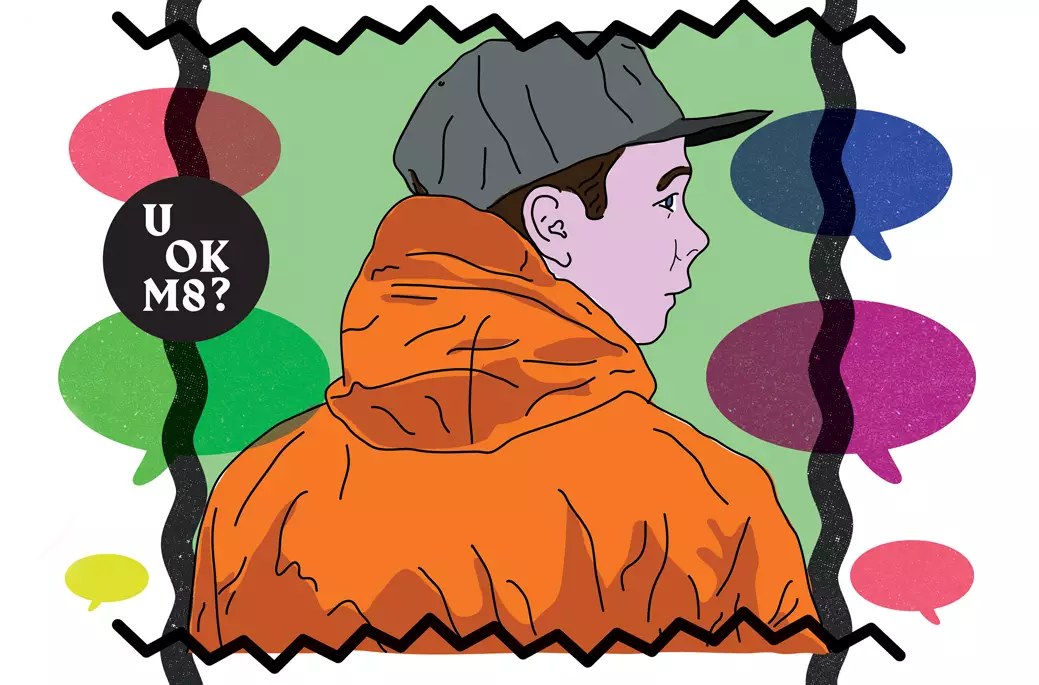
"I think one of the main things for me was that I wasn't understood. I felt rejected and not part of society. I think that feeling of being misunderstood is up there in terms of the struggles autistic people can have."
18-year-old music student Nick Gilling - who eight years ago was diagnosed with Asperger syndrome, a high functioning form of autism, is one of the many people on the autistic spectrum to experience mental health problems every year.
With research conducted in 2016 showing 79 percent of autistic adults meet the criteria for having a mental health problem at some point during adulthood, and with more than one in 100 people thought to be on the autistic spectrum, autistic people represent a small but significant percentage of those currently being treated for mental health problems in the UK.
People with Asperger syndrome are usually of average or above intelligence. However, those with the condition often struggle with aspects of social communication that most of us take for granted.
As Nick tells me, autistic people are often perceived as 'different' by others and this can lead to them becoming socially excluded at school and in the workplace, something which can often cause and exacerbate mental health problems.
At primary school Nick was the victim of bullying by classmates which teachers failed to fully deal with. This aggravated his anxiety to the point that he struggled to leave the house and it left him unable to attend school from years five to eight.
"People at that school age didn't really understand what autism was, and even for me - as someone suffering from it - I struggled to understand it," he says. "I think as far as the other people not experiencing it feel, people with Asperger's are just a little bit weird and that instigates you being treated differently and can progress to bullying."

Although Nick first encountered these problems in the playground, you don't have to spend too much time online to see there continues to be problems in the way people talk about and treat autistic people. Take, for instance, how Katie Price's autistic son Harvey continues to be used as a comment section punchline, or how Time magazine ran a controversial feature in which it described the Internet as 'a sociopath with autism' two months ago - in effect using the condition as a euphemism for callousness and a lack of empathy.
The National Autistic Society, one of the organisations working to promote awareness of autism in the UK, believes that much of the confused attitudes and negative treatment of those on the autistic spectrum is due in part to a lack of public understanding of the condition.
The recent 'Too Much Information' campaign by the society focused on increasing the public's understanding of autism, so people can recognise autistic behaviour and respond with empathy.
Sarah Lambert, Head of Policy at the National Autistic Society, tells me that the public can play a big role in helping autistic people deal with their mental health difficulties.

"We know that late diagnosis, lack of support and social isolation are big causes of mental illness among autistic people," she says. "A recent survey we carried out found that 79 percent of autistic people feel socially isolated and half sometimes don't go out because they're worried about how people will react to their autism."
The charity's research has shown that the current lack of understanding means autistic people and their families are sometimes stared at or 'tutted' at in public. Over time these reactions lead to autistic people avoiding places where they might feel overwhelmed or judged.
Lambert added: "We've seen how understanding from the public as well as support from experienced professionals who understand autism can make a huge difference, and in some cases prevent mental health problems from developing in the first place."
"When people recognise that someone is autistic, and understand the difficulties they face, they're more likely to respond with empathy and understanding. This can help reduce levels of isolation among autistic people and their families."
For Nick, recovery from the severe anxiety and agoraphobia (fear of open spaces) he experienced as a child was a slow and gradual process. Although he still continues to suffer from anxiety, it was at its severest during his early teenage years, and with the help of his family, Nick has found ways to manage the condition.
From the age of 12 he began to attend classes again, going to a specialist unit attached to a mainstream school. It was here that he developed coping mechanisms to help deal with his anxiety.
Having experienced regular meltdowns (a situation where an autistic person is so overwhelmed by a situation that they temporarily lose behavioural control, as part of which they shout, scream or lash out), it is now three years since Nick last experienced one. Although all autistic people have different coping mechanisms, he often relies on putting in his earphones and listening to music when he feels stressed.
His family and desire for independence was a major motivation behind him working to make sure his anxiety was manageable in the long-term.
"Even though I was unable to leave the house when I was younger, my family - and my mum especially - were very keen on getting me to a point of independence where I could do everything and not have a problem with it," he tells me.
"Because I was agoraphobic, I was afraid that when my mum died I wouldn't be able to support myself or leave my house. I think that was a massive motivation for me to get to a point where I could do stuff on my own."
As well as starting a full-time course at the Leeds College of Music this month, studying music technology, Nick also serves as a youth ambassador raising awareness about autism.
Some of Nick's music.
Advert
His recent work has included working with retailers to make shops more accessible to people on the autistic spectrum and their families, as some people with autism can be hypersensitive to sensory stimulus, including lights and sounds.
"One of the things I've done is work with high street retailers, making their environments more accommodating for people with autism," he tells me. "We made a film where autistic people talked about the retailers they felt needed to become more autism friendly, which can range from anything to changing the lighting levels to the music they play."
As with any group at an increased risk of poor mental health, there is no instant solution to improving autistic peoples' ability to cope with their condition.
But alongside better training for mental health professionals and more research into what support works best for autistic people, it's hoped that public awareness of the condition and greater acceptance of it will mean better outcomes for those autistic people in need of treatment and support for mental health conditions.
Nick agrees: "I think getting more people aware of autism makes a big difference. It would be good to get to a point where if somebody has a meltdown in public then it's accepted."
Advert
Illustrations by danwilson1982
If you're interested in finding out more about autism and mental health, you can visit the National Autistic Society's website.
Advert
'U OK M8?' is an initiative from TheLADbible in partnership with a range of mental health charities which will feature a series of films and stories to raise awareness of mental health.
Explore more here and don't suffer in silence. Reach out. It's the brave thing to do.
MIND: 0300 123 3393.
Samaritans: 116 123.
Advert
CALM: Outside London 0808 802 5858, inside London 0800 58 58 58.
At TheLADbible we're trying to gather the biggest picture of mental health for young people and we're working with a range of charities so that our findings can help them. Filling in this poll will help us find out the extent of the problem.
Featured Image Credit:Topics: Mental Health